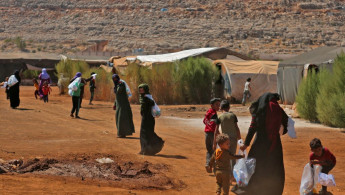Cholera vaccine drive in earthquake-hit Syria amid fears of dangerous outbreak
The UN launched a ten-day cholera vaccination campaign on Tuesday in areas of northwest Syria most affected by the devastating 6 February earthquakes, which killed at least 50,000 people in Turkey and Syria.
The World Health Organisation (WHO) and the UNICEF children's agency will work with Syrian medics to deliver around 1.7 million doses of cholera vaccines to people in Idlib and Aleppo amid fears of a spread of the disease, The New Arab’s Arabic service Al-Araby Al-Jadeed reported.
Syria has already suffered a chronic cholera outbreak since September when the earthquake hit with over 50,000 suspected cases in northern Idlib and Aleppo provinces. Around 18 percent of the cases are internally-displaced persons, UNICEF reported.
The recent earthquakes - which killed at least 10,000 Syrians - have disrupted access to safe water, sanitation, and hygiene, increasing the risk of "water-borne diseases, including cholera" among the population, UNICEF said.
"Prevention is better than the cure. I have seen some friends and relatives who had cholera and the extent of the suffering they experienced… I do not want to see anyone in my family in this situation," Abu Abdo Al-Youssef, a resident of Harem, told The New Arab’s Arabic language service Al-Araby Al-Jadeed.
The threat of a new outbreak has caused huge stress for Syrians in the north, who said they "can't always control" their safety.
"Children may eat fruits irrigated with contaminated water and become ill, especially since some farmers depend on sewage water in watering their crops without caring about the people," Al-Youssef added.
The vaccination campaign targets all age groups from babies to centenarians, Wissam Al-Hamoud, a supervisor at the Kafr Yahmul Center, told Al-Araby Al-Jadeed.
Areas targeted in the vaccine drive will include Sarmada, Maaret Tamsrin, Dana, and Atmeh districts in Idlib, and in Azaz district in northern Aleppo.
"[Around] 1,400 teams of health workers and community volunteers will implement the... campaign using a house-to-house strategy, as well as reaching displaced people living in camps, markets, and school sites," UNICEF stated.
Cholera is generally contracted from contaminated food or water and spreads in residential areas lacking proper sewage networks.





 Follow the Middle East's top stories in English at The New Arab on Google News
Follow the Middle East's top stories in English at The New Arab on Google News


